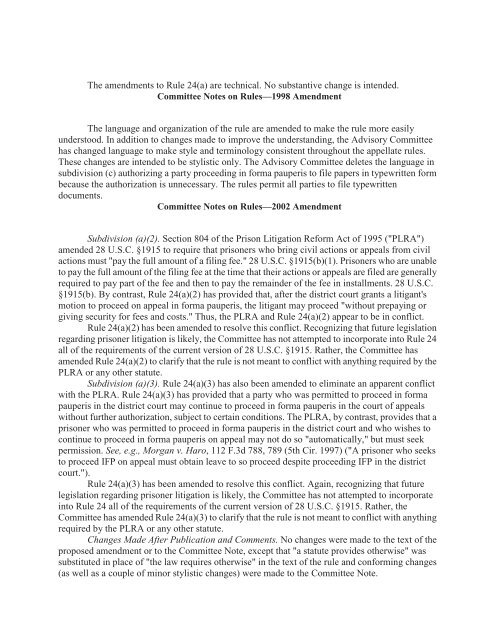Federal Rules of Appellate Procedure 2014-2015, 2014a
Federal Rules of Appellate Procedure 2014-2015, 2014a
Federal Rules of Appellate Procedure 2014-2015, 2014a
You also want an ePaper? Increase the reach of your titles
YUMPU automatically turns print PDFs into web optimized ePapers that Google loves.
The amendments to Rule 24(a) are technical. No substantive change is intended.<br />
Committee Notes on <strong>Rules</strong>—1998 Amendment<br />
The language and organization <strong>of</strong> the rule are amended to make the rule more easily<br />
understood. In addition to changes made to improve the understanding, the Advisory Committee<br />
has changed language to make style and terminology consistent throughout the appellate rules.<br />
These changes are intended to be stylistic only. The Advisory Committee deletes the language in<br />
subdivision (c) authorizing a party proceeding in forma pauperis to file papers in typewritten form<br />
because the authorization is unnecessary. The rules permit all parties to file typewritten<br />
documents.<br />
Committee Notes on <strong>Rules</strong>—2002 Amendment<br />
Subdivision (a)(2). Section 804 <strong>of</strong> the Prison Litigation Reform Act <strong>of</strong> 1995 ("PLRA")<br />
amended 28 U.S.C. §1915 to require that prisoners who bring civil actions or appeals from civil<br />
actions must "pay the full amount <strong>of</strong> a filing fee." 28 U.S.C. §1915(b)(1). Prisoners who are unable<br />
to pay the full amount <strong>of</strong> the filing fee at the time that their actions or appeals are filed are generally<br />
required to pay part <strong>of</strong> the fee and then to pay the remainder <strong>of</strong> the fee in installments. 28 U.S.C.<br />
§1915(b). By contrast, Rule 24(a)(2) has provided that, after the district court grants a litigant's<br />
motion to proceed on appeal in forma pauperis, the litigant may proceed "without prepaying or<br />
giving security for fees and costs." Thus, the PLRA and Rule 24(a)(2) appear to be in conflict.<br />
Rule 24(a)(2) has been amended to resolve this conflict. Recognizing that future legislation<br />
regarding prisoner litigation is likely, the Committee has not attempted to incorporate into Rule 24<br />
all <strong>of</strong> the requirements <strong>of</strong> the current version <strong>of</strong> 28 U.S.C. §1915. Rather, the Committee has<br />
amended Rule 24(a)(2) to clarify that the rule is not meant to conflict with anything required by the<br />
PLRA or any other statute.<br />
Subdivision (a)(3). Rule 24(a)(3) has also been amended to eliminate an apparent conflict<br />
with the PLRA. Rule 24(a)(3) has provided that a party who was permitted to proceed in forma<br />
pauperis in the district court may continue to proceed in forma pauperis in the court <strong>of</strong> appeals<br />
without further authorization, subject to certain conditions. The PLRA, by contrast, provides that a<br />
prisoner who was permitted to proceed in forma pauperis in the district court and who wishes to<br />
continue to proceed in forma pauperis on appeal may not do so "automatically," but must seek<br />
permission. See, e.g., Morgan v. Haro, 112 F.3d 788, 789 (5th Cir. 1997) ("A prisoner who seeks<br />
to proceed IFP on appeal must obtain leave to so proceed despite proceeding IFP in the district<br />
court.").<br />
Rule 24(a)(3) has been amended to resolve this conflict. Again, recognizing that future<br />
legislation regarding prisoner litigation is likely, the Committee has not attempted to incorporate<br />
into Rule 24 all <strong>of</strong> the requirements <strong>of</strong> the current version <strong>of</strong> 28 U.S.C. §1915. Rather, the<br />
Committee has amended Rule 24(a)(3) to clarify that the rule is not meant to conflict with anything<br />
required by the PLRA or any other statute.<br />
Changes Made After Publication and Comments. No changes were made to the text <strong>of</strong> the<br />
proposed amendment or to the Committee Note, except that "a statute provides otherwise" was<br />
substituted in place <strong>of</strong> "the law requires otherwise" in the text <strong>of</strong> the rule and conforming changes<br />
(as well as a couple <strong>of</strong> minor stylistic changes) were made to the Committee Note.


















